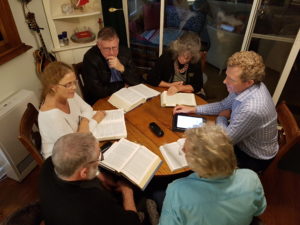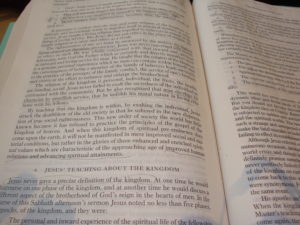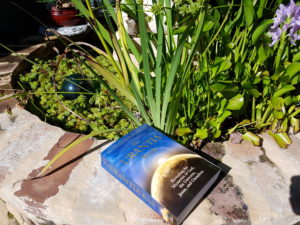© 2017 Charles Laurence Olivea
© 2017 International Urantia Association (IUA)

Great trees possess a majestic presence, such as the Grizzly Giant of the Sequoia Forest in Yosemite, California. It is quite interesting, even instructive, to reflect upon the fact that they begin as small seedlings, emerging as saplings, and over a long period of time grow to become nature’s monarchs.
Likewise, study groups are establishing roots for a great movement, whose aim over time is to disseminate The Urantia Book and its teachings, having a transformational influence on the world. Study groups may very well constitute the primary engine to achieve the necessary momentum toward human planetary destiny. But to be successful this movement must be nourished by living spiritual virtues of truth, beauty and goodness. Then the world, someday, will be able to see a majestic fraternity of men and women who exemplify the principle of universe unity made possible by higher teachings of God’s light and life. We, students of The Urantia Book, past, present and future, have been given the opportunity to help make this possible.
The socialization or spread of the Fifth Epochal Revelation through a growing network of study groups will depend on what participants bring to such gatherings and by what they take from them. The interactions between persons, when done in a revelatory search for God, can tap into the spirit of his grace, thereby, raising human consciousness. Remember, the search for God is nothing less than the search for the source and center of all things and beings. What’s more, an Archangel of Nebadon reassures us that
…knowledge is possessed only by sharing; it is safeguarded by wisdom and socialized by love. [UB 48:7.28]
A Solitary Messenger reinforces this point by the generalization that
Personality cannot very well perform in isolation. Man is innately a social creature; he is dominated by the craving of belongingness. [UB 112:1.6]
To know others who share kindred minds and souls is the great immediate benefit of study groups. The thesis offered in this essay concerns the living rationale for individual persons to meet in study on a regular basis seeking God intellectually and spiritually.
¶ A Recommendation for New Wine Skins
In that spirit, I would like to suggest we think of each study group as a “school.” Then, we may consider the educational potential in every study group as a kind of informal process of “schooling.” But it is an educational experience that strives to draw a straight line between Paradise and Urantia. Logically, if we view study groups in this light, the authors of the Urantia Papers, may be thought of as the “faculty. The “pedagogy” consists mostly of “intelligent conversation.” The text of the book will make up the “curriculum.” Lastly, our “mission” has the benign audacity of attempting—long term—the rehabilitation of our home planet.

We go beyond the role of being merely readers of the book; we are more in the role of students looking for Living Water and the Bread of Life. A student in this context may be defined as an attentive, systematic observer, who is engaged in mind and soul as a cosmic citizen growing with the Supreme.
A new viewpoint of old facts or on a conventional perspective can constitute a “new wine skin.” That is what is proposed here. The usefulness of a different viewpoint was explained by an Archangel, while referencing statements of human philosophy for instructional purposes on the First Mansion World:
Only a poet can discern poetry in the commonplace prose of routine experience. [UB 48:7.22]
This designation of study groups as “schools” with all the educational implications contained therein opens up the act of study as a higher, more dignified, loftier concept—given their revelatory character and (potential) planetary significance. It deepens and broadens one’s universe perspective of them, hence, the “new wine skins.”
Furthermore, the person-to-person make-up of study groups can serve as the means to maximize the dynamics of group study. I believe that relationships between fellow mortals dedicated to revelatory study extend to the Universal Father, Michael of Nebadon, the Supreme and the angels. It is worth reflecting on what a Solitary Messenger has told us concerning the vitality of relationships among persons:
Everything nonspiritual in human experience, excepting personality, is a means to an end. Every true relationship of mortal man with other persons—human or divine—is an end in itself. [UB 112:2.8]
With this observation in mind, schools (study groups) may be understood in terms of the major facets in the interactions between persons: heart-to-heart; mind-to-mind; soul-to-soul.
¶ The Nature of Study and its Morontia Significance
The term, ‘to study’, appears to have originated in the English language sometime during the 14th Century. It may be defined as
“…a state of contemplation…application of the mental faculties to the acquisition of knowledge … in a particular field … or to a specific object … careful extended consideration … or analysis of a phenomenon … or question.” The modifying term, in-depth, was coined in 1965 and may be defined as “comprehensive … thorough … and in-depth study.” (Webster’s Ninth New Collegiate Dictionary) (Emphasis added)
The Urantia Book is designed for study, in my opinion. This is evident in the way facts, meanings and values are presented. Over the years, I have heard many persons comment that as questions are raised in one paragraph they are often answered in the following paragraph. There is a logical progression from the general to the particular. It is the nature of the revelation to invite some level of inquiry: From whence have I come? Who am I? Why am I here? Where am I going?
A Divine Counselor has noted that:
The religious challenge of this age is to those farseeing and forward-looking men and women of spiritual insight who will dare to construct a new and appealing philosophy of living out of enlarged and exquisitely integrated modern concepts of cosmic truth, universe beauty, and divine goodness.” [UB 2:7.10] (Emphasis added)
Study (complemented by service) is a profoundly important feature of the challenge. Anyone really committed to the Fifth Epochal Revelation will take study seriously.
To learn from the text of The Urantia Book, studying, then, is a must. An in-depth study of the revelation would be necessarily comprehensive and thorough. Another way to illustrate this point, either individually or collectively, can be found in synonyms, listed here:
| best effort | trial and error | expect |
| one’s utmost | inquiry | digest |
| discover | examine | dig |
| question | cross-question | cross-reference |
| propose an idea | fact finding | open up for discussion |
| meticulous | precise | detailed |
(Roget’s International Thesaurus, 7th Edition)
Certain inferences may be drawn from these terms concerning the nature of study. The importance of the art of listening comes to mind. Jesus placed a supreme value on active (engaged) listening. He paid very close attention to what was (and what was often not) being expressed. He taught the most when he said the least. Another implication of the synonyms is the necessity to contribute to the flow of conversation with thoughtful, logical ideas and/or questions. Showing a respect for facts must be in play. It is vital to group study to make the distinction, when disagreeing with others, not to be disagreeable. The reader is left to draw still more inferences from this list.

Thinking about study groups as revelatory schools can enhance the spiritual and cosmic dignity of them, investing them with universe-capital. It deepens and widens the context of these gatherings. They are not social get-togethers, although friendly social ties should always be encouraged. This revelation entails some rather heavy lifting. The long view indicates that the destiny of civilization on Urantia and the future of the religion of Jesus hang in the balance between human imperfection and prospects for eventual light and life.
With a nod to the Divine Counselor, we ought to study in the way the writing of The Urantia Book is constructed and arranged, that is to say, use the same pedagogical principles—go from the complex to the simple, i.e., from the long view to the moving present, utilizing the perspective of origin, history and destiny applied to contemporary affairs. (UB 19:1.5-6) With this idea in mind, it would be profitable to determine how the morontia culture prioritizes the practice of study. What “universe value” is assigned to studying?
First of all, we learn that when most pilgrims of time attain the Fifth Mansion World,
Study is becoming voluntary, unselfish service natural, and worship spontaneous. [UB 47:7.5]
Isn’t it interesting, of all the different behaviors or norms the Brilliant Evening Star could have focused on, study, service and worship were emphasized. The first develops mind (mota); the second exercises the soul (to borrow a phrase); and the third communes with God (the supreme joy of personality existence). What grand priorities! But there is more.
It remains my sense that characterizing human study groups as “schools” is hardly farfetched.
An Archangel has given us a vivid description of the priorities of morontia culture on Jerusem, our planetary system capital.
The activities…are of three distinct varieties: work, progress, and play. Stated otherwise, they are: service, study, and relaxation. [UB 2:7.10] (Emphasis added)
Interestingly, study is equated with progress and service equated with work. These morontia norms, sketched by the Archangel, must reflect the central aims of the schools of thinking, feeling and doing. This Archangel continues by noting that
Those things which you might have learned on earth, but which you failed to learn must be acquired under the tutelage of…faithful and patient teachers. [UB 48:5.7]
Indeed, schooling is a universal concept and practice. We learn from the Brilliant Evening Star that “The entire universe is one vast school.” (UB 37:6.2) The Archangel elaborates on this point:
If the Gods designed merely to take you on one long and eternal joy excursion, they certainly would not so largely turn the whole universe into one vast and intricate practical training school, requisition a substantial part of the celestial creation as teachers and instructors, and then spend ages upon ages piloting you, one by one, through this gigantic universe school of experiential training. [UB 48:8.3]
Study, service and worship are a multi-sided jewel. Again, one may observe the greater dignity of characterizing study groups as “schools.” Study groups ought to be recognized for their universe-value, the contribution they can make to implement God’s command for ascending mortals eventually to become perfect even as he is perfect.
¶ Study Group Structure and Leadership
It may be useful and valuable here to provide some suggestions or guidelines about study group management. What follows is a kind of “bottom-up,” practical look at the working dynamics of study groups. The ideas in this section are largely empirically based.
There is no centralized authority over study groups. The original Urantia Brotherhood envisioned a relatively democratic system. This de-centralization is an antidote to the development of an ecclesiastical authority, a ruling clergy. There appears to be a consensus among devotees of The Urantia Book to keep it this way.
Generally speaking, two different approaches have emerged over time as to how folks organize study groups: one emphasizes more reading and less discussion; the other values conversation over mainly reading. Participants in the latter approach are expected to read assigned material prior to a meeting. A more intense, closer mode of study would seem to favor the latter.
Concerning the latter approach, people need time to ponder questions and/or issues, hence assigned study. It can be structured in a number of ways. Some include studying the papers in the order they are presented from first to last, or, a particular topic or theme may be picked. A question can serve as the central focus of discussion. Maximizing opportunities for each person to contribute to an intelligent conversation should be a key priority. It is important to have more light than heat in the conversation. Effective leadership exemplifies respectful listening. The point here is to strike a balance between what an individual says and how the others interact as a group. Staying centered on the scope and depth of the assigned study is a major priority. Participants for the most part would be expected to keep their comments within the assigned text. They should avoid bringing up outside sources since other members probably would not have had any opportunity to read and think about extraneous material beforehand. This approach encourages and respects a certain kind of discipline, adding to the cohesion of the group. The overall aim is to have minds engaged, exchanging ideas.

Keeping a group on task is an executive function, although each participant shares responsibility as well. The leader of a study group would be wise to act in the role of tutor. A tutor guides, makes suggestions, presents questions to keep the talk more focused, sets a friendly tone by a humorous anecdote, and leads generally by good example. Ideally, the role of tutor could be rotated, at least from among those who are willing to so act. But not everyone is comfortable in such a role. But someone has to keep the group centered on the subject at hand.
Time ought to be set aside for announcements and the like. Keeping in touch with particular members of the study group is a good thing to do. A kind word may be necessary if someone is in crisis, including situations between meetings if the need arises. We should all remember that friendship can add greatly to the connecting substance of the group. The desire to do good should always be tempered or balanced by graciousness by being tactful and courteous while bearing good intentions. Proper leadership of any study group carries with it an important social dimension.
On the last point, the role of the host may or may not overlap with the role of leader. Stronger social or emotional ties have their place in the scheme of things. When it comes down to what really matters, the first priority is to try to discern God’s will. We are all fellow mortals on the same broad path as pilgrims of time ascending the pre-ordained levels of universe reality.
Lastly, consideration might profitably be given to group prayer and worship. For example, prayer can be used to open and close a meeting. Seeking the Father’s indwelling spirit or Michael’s Spirit of Truth can be a powerful way to help a gathering be more cogent and yet calm at the same time. I always invite Jesus to “join” us. The act of study is augmented when the Spirit of Truth is openly welcomed into the group’s midst.
We can aspire to be effective instruments in the search for truth, but the Father and the Creator Son are always the inspiration. I so like what was said by the Mighty Messenger about the Spirit of Truth, the greatest gift Michael gave to Urantia, besides his actual bestowal:
Having started out on the way of life everlasting, having accepted the assignment and received your orders to advance, do not fear the dangers of human forgetfulness and mortal inconstancy, do not be troubled with doubts of failure or by perplexing confusion, do not falter and question your status and standing, for in every dark hour, at every crossroad in the forward struggle, the Spirit of Truth will always speak, saying ‘This is the way.’ [UB 34:7.8] (Emphasis added)
It seems to me that the Spirit both clarifies and comforts. The Spirit is very helpful to study and service. Trying to start a study group may be daunting; serving as a leader can be problematic. Why not form a habit of accessing some of the spiritual resources given to our world. The Chief of Urantia Midwayers has something to say on this.
_Group or congregational praying is very effective in that it is highly socializing in its repercussions. When a group engages in community prayer for moral enhancement and spiritual uplift, such devotions are reactive upon the individuals composing the group; they are all made better because of participation… _ [UB 91:5.2] (Emphasis added)
Even study needs a measure of courage to face issues or questions that intimidate many others. It takes even more courage to discuss them with a group of people whose perceptions differ considerably. Hearts can be made calmer and intellects clearer if the participants are willing to pull together in a common petition, or, to commune together in worship, with a higher power. It is important to remember that this should be done without pressure or coercion. Still, the spiritual cohesion of a group may realize broader, deeper revelatory insights. In all such efforts, trust God.
¶ God the Supreme and the Master Seraphim
While living on Urantia as creatures of time and space, we are also cosmic citizens. The Mighty Messenger points out that
With God the Father, sonship is the great relationship. With God the Supreme, achievement is the prerequisite to status — one must do something as well as be something.” [UB 115:0.1] (Emphasis added)
We have seen how the morontia culture prioritizes study and service. It does appear that studying runs as a norm throughout the universes of time and space. I believe the process of starting and keeping study groups going contributes directly to the Supreme. The universe-value of studying is naturally linked to the Supreme. It is something for us to be conscious of. The Supreme is actualizing our potential in the ascension scheme of universe achievement even while we reside on earth. Down here, as evolutionary creatures, we can add to the gradual, unfolding development of Orvonton, our superuniverse, in reciprocity with the finite God, the God of evolution. This reciprocity is inherent by design in the relationships of Supremacy. It is a high and noble task (actually a cosmic, moral duty) to be contributors to universe building. The Universal Father has delegated to us something important to do.

To perform our role as cosmic citizens in a worthwhile and useful manner, we need to possess a deeper and broader knowledge of the origin, history, and destiny of many aspects of universe reality. In turn, that knowledge helps us to sort or identify essential facts, meanings and values of time and space—the function of study. On the other side of the coin, service can be rendered more precise and appropriate to those whom we would serve. Thus, study and service work together as we attempt to do our share in the growth of the Supreme.
But to bring this line of reasoning directly to our home planet, we should be mindful of the Master Seraphim of Planetary Supervision. Working with the angels is crucial to the success-potential of study groups. I do not think this is superstitious; rather it is a suggestion grounded in the long view of intelligent faith and inspired by sincere prayer. There is a lot to pray for. For instance, petitions may be directed to the angels for assistance in organizing and maintaining a study group. The angels and the divine spirit can be solicited to guide or encourage individuals to consider joining one’s study group.
The Angels of Enlightenment come to mind. According to the Chief of Seraphim, our world
…is now receiving the help of the third corps of seraphim dedicated to the fostering of planetary education. These angels are occupied with mental and moral training as it concerns individuals, families, groups, schools, communities, nations, and whole races. [UB 114:6.11] (Emphasis added)
Is it farfetched to suggest that our study groups fit neatly within their sphere of interest? The Urantia Papers as the subject of group study seem to correlate directly to these angels’ area of responsibility.
If this is so, we might consider this framework of our relationship as part of the new wine skin of the Fifth Epochal Revelation. This idea also applies to our philosophically organic connection with God the Supreme. These key ties to unseen friends and allies and to the finite God ennoble the routine tasks of those who gather to study. The appeal of this perspective on our labor in the evolutionary vineyards is one of universe-romancing.
¶ A Lighthouse in a Worldwide Cultural Fog

Notwithstanding the present confusion, sometime in the future, there will likely be a growing number of people who, while not being readers themselves of The Urantia Book, will know persons who do read and study it. Perhaps in many (most) cases, the latter will be a family member, a close friend, an acquaintance, a neighbor, co-worker or even an approachable stranger. Typically, those studying the revelation will probably be persons of average socio-economic status and live and work in ordinary circumstances.
As knowledge about the book spreads, its reputation in the public mind may largely be determined by its association with these kinds of connections. So, as our movement breaks into the public’s consciousness, we hope many will say something like this, “Oh, I know her. She reads that book. She is my neighbor and is a normal person.”; or, “He works in my office and is an okay guy. I found out he has been reading that book for years.” Social recognition of such a caliber can only evolve from excellence in thought and a strong, positive and intelligent living faith in God. Modern men and women are seeking to find individuals or groups who demonstrate intellectual integrity and spiritually affirmative lives.

If our gatherings acquire such a reputation, then the Fifth Epochal Revelation may seem less strange and be appreciated more for its content and quality in a growing number of social and religious circles. At least, that is an outcome we can hope for. The revelation, then, can really start to have a transformational effect upon society at large. But we must be well grounded in knowledge of its teachings in order to be at-the-ready to address the many questions people will naturally have. Questions (including objections) will range from ones that are straightforward or basic to complex subjects, even vexing issues.
In the meantime, study groups can continue to operate under the “radar” of the modern media and all of its mixed, uncertain scrutiny. Our study groups, conferences and other projects are “below” the cultural eye of today’s mainstream. We live in a time of confrontation between science and religion, nationalism versus internationalism, political/moral ideologies run amok causing physical wars and wars of words, to cite a few examples. Many people lead hectic lives and are frequently in a hurry, scurrying around almost as flotsam and jetsam. Humanity will probably have to settle down and be somewhat calmer before wider reception of these revelatory teachings occurs.
However, because of this time delay we have an ongoing opportunity to mature for the day when people of all backgrounds will bring their questions of the meaning of life to the surface.
Our movement has, therefore, a strategic advantage! The time delay will test our patience as we study and serve unobtrusively in a kind of private ministry. This has something in common (in principle at least) with the approach Jesus’ ministry took as he prepared for the Gospel to be publicly proclaimed. If we grow quietly, collecting the riches of the mind and the joys of the soul, we will not only survive modernity’s vicissitudes of this age, we can realistically hope to emerge—as a cause—successfully.

Our teachings can serve as a lighthouse whose beacon will shine brightly to a world that will begin to tire of the fog of anxiety and mayhem. I believe that when the time is ripe, God’s grace will influence our fellow mortals to want something better. Without necessarily (fully) realizing it, many will want the clarity and comfort of something called life and light. The lighthouse-effect will come if we possess a respected reputation—an image derived from the substance of a dignified, unified, spiritually fragrant, and intellectually vibrant network, symbolized by three blue concentric circles and/or the name, “Urantia.”
Can we not unite around this hoped-for outcome as a common goal of our movement?
Would not the logical means to achieve such an end be the evolution of “thousands of study groups?”—“schools” meeting in people’s living rooms? The lighthouse effect of these schools may be thought of in two ways: each study group could become a lighthouse on its own or the light of the benign coalition of thousands of study groups in the aggregate on a planetary scale. Or, perhaps both ways on two different levels at the same time!
Achieving all of this depends on the quality and the extent of combining mind and spirit in an evolutionary effort. A great teacher earlier in the history of The Urantia Book noted that this revelation speaks profoundly to both mind and spirit, unlike so many philosophies and religions. Our movement to disseminate its teachings must be God-centered. We need to be humble. We did not write it; it was written for us. The Fifth Epochal Revelation falls under the authority of Michael of Nebadon. Hence, our loyalty, friendship and respect should be directed first toward him and then to each other.
¶ Conclusion
The humble act of studying The Urantia Book is a noble endeavor. It is noble when there is a sincere, intelligent attempt (animated by living faith) to align as cosmic citizens with the Supreme as it develops the grand universe of time and space.
I allude to the loving reciprocity of Supremacy as explained by a Mighty Messenger:
In the present universe age this dual motion is revealed in the descending and ascending personalities of the grand universe. The Supreme Creator Personalities and all their divine associates are reflective of the outward, diverging motion of the Supreme, while the ascending pilgrims from the seven superuniverses are indicative of the inward, converging trend of Supremacy. [UB 115:6.5]
In addition to all of this, we benefit right now as children of the Universal Father—true brothers and sisters—foretasting in time the truth, beauty, and goodness of eternal meanings.
For sure, we ought to love our fellow mortals as Jesus loves us. We may sensibly hope that someday, at a later time, “thousands of study groups” and even “schools” will come to connote a brotherly and sisterly fraternity, world renowned, knitted together and inspired by the divine spirit and the angels. The real means of success will be in the appeal of our growing reputation to individuals and (potentially) to civilization itself, drawn to teachings of light and life that will illuminate the intellect and delight the soul.
Charles Laurence Olivea
